“The one thing that leaps out when you read about these authors is that they were all fairly disastrous individuals; and although they were probably no more so than anyone else whose life we know about, their example is hardly likely to lure one along the path of letters.”—Javier Marías, Written Lives.
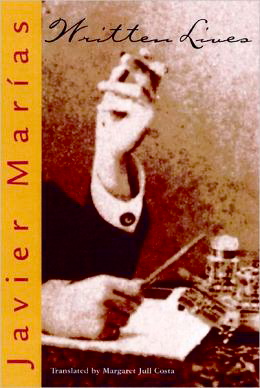 Illustrating this collection of anecdotes about twenty world-famous authors with startling photographs, Javier Marías, one of Spain’s most respected contemporary authors, shares personal oddities about each of them. Here he presents individual mini-bios as if they were short stories, “enhancing” some details (though all details are said to be true) and minimizing others, bringing literature’s icons to life, showing them with all their warts and blemishes. Some of these tales have the feel of secret histories, those stories that the authors’ publicists (if, indeed, such animals had existed at the time) would try to suppress. Yet Marías writes with humor, not with bile—and in most cases with actual affection, the three exceptions being James Joyce, Thomas Mann, and Yukio Mishima.
Illustrating this collection of anecdotes about twenty world-famous authors with startling photographs, Javier Marías, one of Spain’s most respected contemporary authors, shares personal oddities about each of them. Here he presents individual mini-bios as if they were short stories, “enhancing” some details (though all details are said to be true) and minimizing others, bringing literature’s icons to life, showing them with all their warts and blemishes. Some of these tales have the feel of secret histories, those stories that the authors’ publicists (if, indeed, such animals had existed at the time) would try to suppress. Yet Marías writes with humor, not with bile—and in most cases with actual affection, the three exceptions being James Joyce, Thomas Mann, and Yukio Mishima.
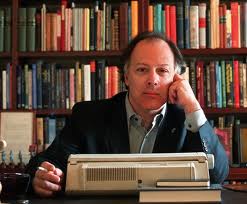
Author Javier Marias
Marías says at the outset that his choice of authors is arbitrary, though all subjects are dead and none of them are Spanish. They come from the United States, Ireland, Scotland, Germany, Japan, Italy, Russia, Poland, Denmark, Czechoslovakia, England, and India, and they reflect a variety of time periods. Lawrence Sterne exists side-by-side with Yukio Mishima and Emily Bronte; Joseph Conrad with William Faulkner and Isak Dinesen; Malcolm Lowry with Rudyard Kipling and Oscar Wilde.
Here one finds the following memorable tidbits from among hundreds of such tidbits:
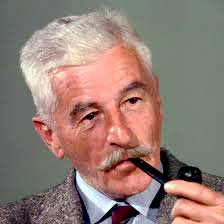
William Faulkner
William Faulkner was fired from working at the University of Mississippi post office because he hated having his reading interrupted: “He told his family that he was not prepared to keep getting up to wait on people at the window and having to be beholden to any son-of-a-bitch who had two cents to buy a stamp.”
James Joyce was afraid of storms and wrote obscene letters (reproduced here) to his wife. He was so egotistical that he once asked, “Don’t you think there is a certain resemblance between the Mystery of the Mass and what I am trying to do?”
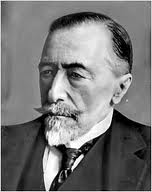
Joseph Conrad
Joseph Conrad would often deny that he had written something that was undoubtedly his, and, when offered proof, “would simply shrug his shoulders…and lapse into one of his [famous] silences.”Henry James “was made both miserable and happy by the same thing, namely that he was a mere spectator who barely participated in life, or, at least, not in its most sterling and exciting aspects.” His “linguistic punctiliousness” was so great that “the simplest question addressed to a servant would take a minimum of three minutes to formulate.”
Robert Louis Stevenson, sickly all his life, was fascinated by evil, associating with Chantrelle, a multiple murderer, whom he considered a friend. Malcolm Lowry, described as “drunk, drunk, drunk,” was the “most calamitous writer in the whole history of literature, which is no mean feat, given the intense competition in the field.” One day, he told about seeing elephants in the street, a hallucination so ridiculous that his friends would not believe him, even when presented with the steaming evidence on the sidewalk.
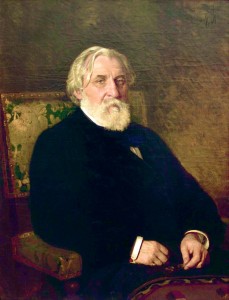
Ivan Turgenev
The author with the most bizarre family life is Ivan Turgenev, whose grandmother murdered an annoying young servant, hitting him over the head with a piece of wood, dragging him over to an armchair, and then sitting on his head and asphyxiating him. His mother drowned all the babies of the serfs on their estate so that their parents would not neglect their duties. The most personally repulsive author Marias describes is Arthur Rimbaud, who never changed his clothes, was covered with lice, and drank constantly. With his best friend Verlaine, he often engaged in bloody battles, once slashing Verlaine’s hands with a knife, and once being shot by Verlaine.
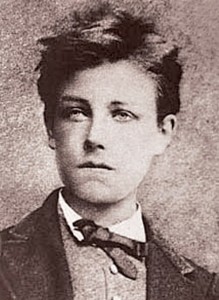
Arthur Rimbaud
Other authors earn great sympathy from the reader—Oscar Wilde, Lawrence Sterne at the end of this life, and the unhappy and reclusive Rudyard Kipling.
A fascinating accumulation of oddities about revered authors, this collection is vibrant in its depictions of their personalities and perceptive in its assessments of how these authors came to be the people they were. Lovers of literary fiction and students of world literature will be delighted by this treasure trove of lesser known facts about the Great Ones. (Translated by Margaret Jull Costa)
Note: The photos with this review are NOT the ones from the book.
Photos, in order: Javier Marias’s photo appears on http://bombsite.powweb.com
William Faulkner: http://www.biography.com
Joseph Conrad: http://www.biography.com
Ivan Tugenev: http://01varvara.wordpress.com
Arthur Rimbaud: http://www.listal.com
